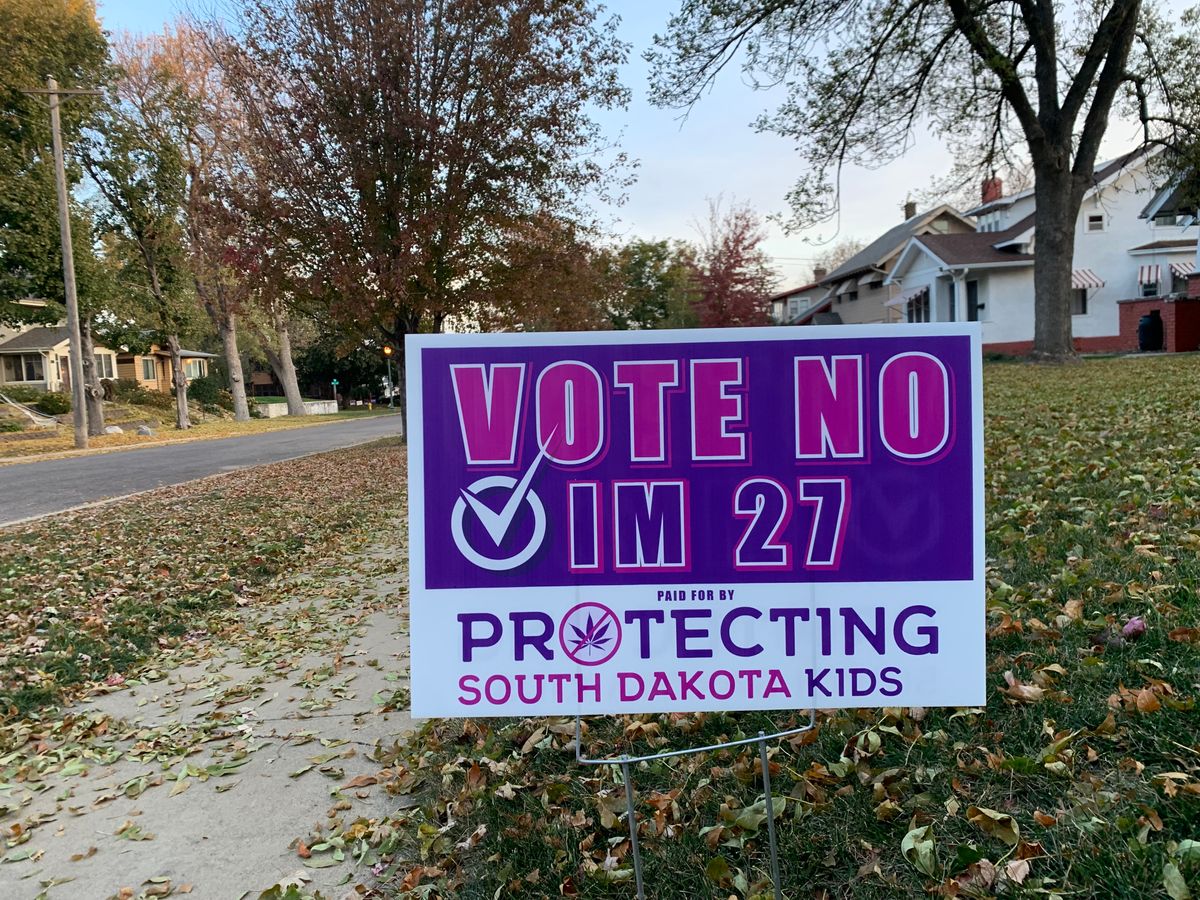Voters to decide on marijuana

South Dakotans first voted to legalize recreational marijuana in 2020 under Amendment A. On Nov. 8, voters will head to the polls again to decide on the issue — this time under Initiated Measure 27.
IM 27 would legalize the possession, use and distribution of marijuana for people 21 and older. South Dakotans could possess and distribute up to one ounce of marijuana, but it does not account for a framework of buying and selling.
People could also plant up to three marijuana plants on private residences if the plants are kept in locked spaces and not visible to the public.
Supporters of IM 27 say legalizing marijuana will direct police resources to more violent crimes and provide residents with better access to medical cannabis.
Augustana sophomore proponent Madelyn Earhart said legalizing marijuana is a safety measure.
“You’re never going to stop people from doing it,” Earhart said. “People are just going to do it, and when you legalize it, it becomes a more controlled substance, and it becomes safer.”
Opponents of the measure have said legalizing recreational marijuana gives children more access to cannabis and causes negative health effects.
Bonnie Omdahl, a volunteer for ProtectingSDKids, said IM 27 could spell danger for South Dakota.
“When you legalize anything, it decreases the perception of harm,” Omdahl said.
IM 27 history
In 2020, Amendment A passed with 54% of the vote. The amendment would have legalized recreational marijuana, medical marijuana and the sale of hemp in South Dakota.
In 2021, the South Dakota Supreme Court found the amendment unconstitutional, as it violated the state’s single-subject rule.
“We’ve been working to restore the will of the people by legalizing [marijuana] for a second time,” Quincy Hanzen, deputy campaign manager of Yes on 27, said. “People seem to be upset about what happened in 2020, and they feel that their vote didn’t matter.”
According to the South Dakota Legislative Research Council, the state would not receive any tax revenue from marijuana sales, but could see financial benefits from marijuana accessory sales, civil penalties and decreased incarceration numbers.
Police resources
Proponents of IM 27 have said police resources should not be focused on marijuana convictions.
“We’re wasting police resources on marijuana arrests rather than focusing on more serious crimes,” Hanzen said.
Omdahl said she has talked to South Dakota’s future attorney general and members of the police force, both of whom told her not many departments are arresting or prosecuting for simple possession of marijuana.
“Anybody who is in jail for more than 15 days, almost certainly that’s someone who plead down from a distribution charge,” Omdahl said. “Almost certainly, that was someone who was selling.”
Hanzen said marijuana possession should be legalized if South Dakota is not charging people.
“If we’re not arresting people for it, then why is it still illegal?” Hanzen said. “[Marijuana convictions] can affect employment opportunities, housing, education and even the ability to serve in the military. It’s really ruined people’s lives.”
Health effects
Proponents said marijuana provides medicinal benefits for psychological and pain disorders, such as opioid and meth addictions, epilepsy, PTSD and multiple sclerosis.
“People with epilepsy are able to get off of their harder drugs and prescription drugs that they’re on and turn to cannabis and find relief,” Hanzen said.
Although South Dakota legalized medicinal marijuana in 2020 under Initiated Measure 26, Hanzen said people still face difficulty in accessing it.
“Few physicians are writing cards or writing recommendations,” Hanzen said. “Veterans, for example, if they receive their healthcare through the VA, their doctor won’t write them that recommendation for cannabis since cannabis is still federally illegal.”
The South Dakota State Medical Association issued a statement on Oct. 6 citing marijuana as a public health concern and advising South Dakotans to vote against IM 27.
Opponents say marijuana use is dangerous for all users, but especially children, as it can lead to negative health effects such as acute psychosis, anxiety and brain loss.
“It is the number one drug associated with completed teen suicides in Colorado,” Omdahl said. “For youthful users, people who are started who are relatively regular users in their teens, there is significant brain loss. The MRI studies have proven that for over ten years.”
Hanzen said proponents have a similar goal to their opponents in that they don’t want to see children gain access to marijuana.
“Where we differ is with the approach. We believe that we need to get cannabis out of the illicit market, out of the hands of children,” Hanzen said, adding the way to do this, “is by having a controlled and regulated system in place.”
Senior Lukas Spencer, a proponent and resident of Colorado, said marijuana could be addictive in some cases.
“Marijuana itself is a significantly less addictive drug, but anyone who says that it’s not addictive is wrong,” Spencer said. “While you do not develop a physical dependency and craving for it, psychologically, you can use it to just escape.”
Omdahl said users across all ages are at an 80% increased risk for heart attack, stroke, anxiety, depression and more.
“Even adult users, a study showed 25% decreased neurocognitive functioning, significant increased risk of psychosis and also significant increased risk of schizophrenia.”
Future
If passed, IM 27 says it will not affect several current South Dakota laws. Private businesses could still impose regulations on employee marijuana use. People would not be allowed to consume marijuana in public places unless a written rule says otherwise.
If IM 27 does not pass, recreational marijuana will remain illegal in South Dakota; however, residents will still have access to medical cannabis. As of Oct. 31, medcannabis.sd.gov said South Dakota has 4,362 approved patient cards.
“I think it’s really important that people read the facts, and read the facts from both sides and make the decision that they think is right,” Hanzen said. “It’s just really important to be educated before you cast your vote.”



